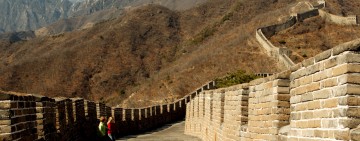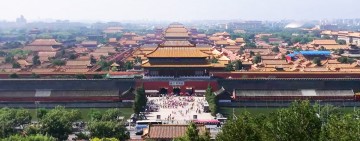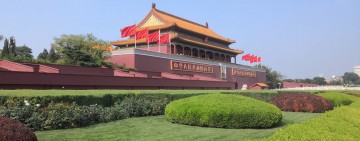Eating and Drinking in China
Last updated on 2022-07-28Aside from the Great Wall and the Forbidden City, one of China’s most famous attractions is its food. Chinese cuisine is diverse, unique, and delicious, from the crispy, succulent flavors of Peking duck to the spicy, nourishing broth of Chengdu’s famous hot pot, and we consider experiencing the local food to be an essential part of any tour.
Introduction to Chinese Cuisine
From Sichuan’s kung pao chicken to savory soup-filled dumplings in Shanghai, Chinese food comes in an endless variety of forms and flavors, making for a truly one-of-a-kind culinary destination for food lovers. Chinese cuisine is difficult to encapsulate in just a few sentences and varies enormously by region. Home to eight culinary traditions, each with its own distinct cooking style, ingredients, and dishes, you’ll never be at a loss for options when seeking a meal in China. Rice and noodles are staple ingredients nationwide, and steamed dumplings and tofu are common throughout the country. You can read more about China’s eight major culinary traditions here and some of the most famous signature dishes in different cities/provinces here to give you an idea of what to expect.
Just like in many other Asian countries, China has a strong street food culture. Walking through the historic hutongs of Beijing or the bustling Muslim Quarter of Xi’an will give you a sense of China’s love of snacks as well as the sheer number of options available.
Eating on Our Tours
We take our guests to authentic restaurants and sometimes even family homes—never tourist traps—so that you can get a genuine taste of the local fare. Sometimes yours might be the only Western faces in the restaurant!
When on a tour, lunch is generally Chinese-style and normally included in the price. While the content of your meal and the dishes available will depend on the area you’re in, our guides will help you order according to your tastes: mild or spicy, meat and/or vegetables, rice and/or noodles. Dishes are served family-style and shared by the whole table. Your driver will eat on his own, but your guide may join you if you would like them to do so.
We don't use the same restaurants on every tour; instead, it depends on where you are at the time you are hungry. You can always ask your guide to change restaurants. We will try our best to help you enjoy a variety of Chinese food during your trip. If you get the taste for a burger or pizza after a lot of Chinese food, then you will have lots of choices in big cities such as Beijing and Shanghai. China also has its share of McDonald's, KFC, and Subway sandwich chains if you need a quick fix.
Our guides are accustomed to handling special diets and the selective dining habits of children. Children often find that they like certain Chinese dishes, such as noodles, fried rice, or sweet and sour pork. Let us know in advance if you have food allergies or other special requests and we can plan accordingly.
Unless there is a special activity planned or you have requested to have all your meals arranged, guests often prefer to relax after a long day of sightseeing and arrange their own dinner. This gives you flexibility in terms of time and cuisine. Handling your own dinner also allows you to have some autonomy and venture out on you own. Your guide can give you restaurant suggestions and in big cities, you can find lots of Western or Chinese options, from fine dining to fast food. Many hotel restaurants offer nice food suited to Western tastes. Hotel staff can often make restaurant recommendations within walking distance as well.
Most hotels offer complimentary breakfast (or it can be added for a small fee). Four- and five-star hotels will generally provide a good Western and Chinese buffet breakfast. Three-star hotels may only have a Chinese breakfast or a Chinese interpretation of a Western breakfast. In any case, a Chinese breakfast is not bad and usually consists of rice porridge, eggs, Chinese style bread, and vegetables. You can read more about some of the most popular breakfast items to try during your travels in China here.
Drinking Water
Tap water in big cities in China is not likely to make you sick as it is chlorinated, so it is fine for showering, brushing your teeth, etc., but we still recommend drinking bottled water as tap water may not be properly sterilized or filtered, and you don't want to upset your system on your big trip.
Hotels in China usually provide two free bottles of water in each room per day. If you need more, you can easily buy them in any small store or supermarket near your hotel. If you are on one of our tours, we provide unlimited free bottled water to all of our guests in your vehicle so you can stay hydrated all day long.
Dining Etiquette
Dining in China is a major social affair, and restaurants come in many shapes and sizes. Banquet-style restaurants with large tables equipped with share-ready lazy susans are common. Servers are at times overattentive, at others difficult to locate. It is not uncommon for your server to hover at your table waiting for you to order immediately upon seating you, and it is common practice to summon a server by calling to them, which can be an adjustment for foreigners.
It is not customary or expected to tip your server at restaurants in China, except at fancier, Western-style establishments. Even there, however, it is not mandatory.
Dining etiquette is quite informal in China. Slurping, burping, and elbows on the table are common occurrences, and are not considered impolite. At most restaurants, several dishes are ordered for the whole table to share, and it is standard practice to use your own chopsticks to serve yourself from shared dishes.
It is considered rude to point your chopsticks directly at another person and to stick your chopsticks upright in a bowl of rice (as it is considered bad luck).
Food Safety Tips in China
In terms of food safety, China has seen its fair share of food scandals. One of the main reasons why these scandals make headlines is because public health authorities are becoming more adept at detecting and stopping food safety threats on time. This is good news to Chinese people and tourists alike, since everyone can enjoy food without much worry.
Many Chinese cooks don’t use their hands for cooking, and there are very few Chinese dishes that you can eat with your hands. However, since you may at some point use a public restroom that lacks sinks, it’s important to bring hand sanitizer along to use whenever needed.
While we want to help you enjoy authentic Chinese food, we see food safety as our top priority. You can always rely on the restaurants selected by our guides, and food in quality hotels is usually trustworthy. When you go out for dinner on your own, however, you need to be careful. Our suggestion is to try restaurants that are busy with local diners, as this is often a good indication of their quality. Of course, you can ask your guides for suggestions at any time.
Sometimes people take a little bit of time to adjust to new spices and ingredients, and especially after a long flight, your stomach might be more sensitive. An upset stomach on the first day in a foreign country is not too uncommon, and it’s not necessarily a sign of food poisoning or illness. However, if you present symptoms that last for more than three days, or your symptoms are severe, then head to a hospital.
Tips for Vegetarian or Vegan Travelers
Many people will tell you that vegetarian dining in China can be a bit of a lottery, but vegetarians and vegans need not fear Chinese cuisine.
China has a long-established tradition of vegetarianism arising from Buddhist practices, and more and more people in China are choosing to follow a vegetarian or vegan diet for health reasons or because of environmental concerns. China produces a vast array of fresh vegetables—many of which you may never even have heard of!—and if you order judiciously you will be rewarded with some delicious, unique dishes.
More and more restaurants in China are accommodating of vegetarian meals and most will have a selection of vegetarian-friendly dishes on the menu. Before you order, simply use one of the phrases below to indicate to your waitress that you don’t eat meat. Western restaurants usually have a strong selection of vegetarian dishes.
If you are a strict vegetarian or vegan and would prefer to eat in a restaurant that doesn’t handle any meat, then you still have plenty of options. Most major cities have at least a couple of dedicated vegetarian restaurants; in cities like Beijing and Shanghai, you can check local expat media publications or international vegan and vegetarian restaurant listings on the Happy Cow website. Outside of major cities, the restaurants attached to Buddhist temples are a good first port of call for vegetarians; the quality varies but the food is guaranteed to be meat-free.
If you are traveling to China on one of our guided tours, then your agent and guide will help arrange your meals according to any dietary restrictions.
Useful phrases
I am vegetarian 我吃素 wŏ chīsù
I am vegan 我吃纯素 wŏ chī chūnsù
I don’t eat meat 我不吃任何肉类 wŏ bùchī rènhé ròulèi
I am allergic to… 我对…过敏 wŏ duì… guòmĭn
I can’t eat… 我不能吃… wŏ bùnĕng chī…
What vegetarian dishes do you have? 你有什么素菜?nĭ yŏu shénme sùcài?
Does this dish have meat in it? 这个菜有肉吗?zhège cài yŏu ròu ma?
Can you make this dish without meat? 这个菜能不能不加肉?zhège cài néng bù néng bù jiā ròu?
Milk 牛奶 niúnǎi
Cheese奶酪 nǎilào
Butter 黄油 huángyóu
Eggs 鸡蛋 jīdàn
Honey 蜂蜜 fēngmì
Chicken stock 鸡汤 jītāng
Meat or fish stock 肉/鱼汤 ròu/yútāng
Lard 猪油 zhūyóu
—
The China Guide is a Beijing-based travel agency that customizes private tours, educational student tours, and incentive trips across China. We have more than ten years of experience crafting tours for tens of thousands of travelers from the United States, Canada, Australia, the United Kingdom, Germany, France, Spain, and beyond. We promise all our tours have no hidden fees, no shopping stops, no touristy restaurants, just memorable experiences! Learn more about us or contact us to start planning your perfect China trip.




